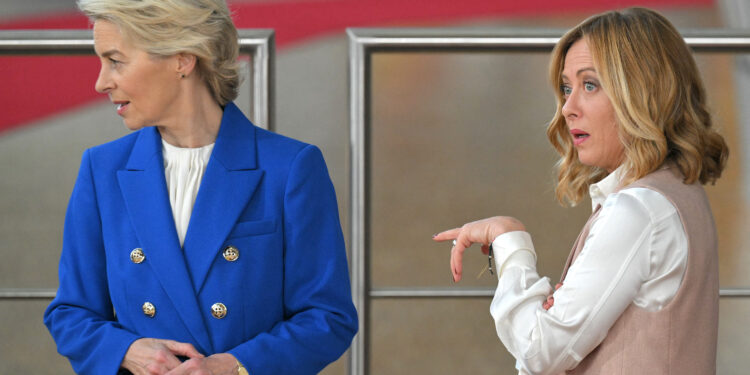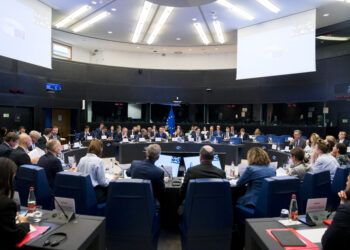Brussels – Once upon a time, the extreme right was the opposition of the centrist majority that led the EU institutions. Until the center-right European People’s Party (EPP) and the Socialists (S&D) of the center-left were dealing the cards in both the European Parliament and the European Council, thus deciding the composition and priorities of the Commission (perhaps propping themselves up with the liberals of ALDE/Renew), and excluding radical right. The balance changed, however, after a series of elections — both European and national — in which the latter saw its support grow significantly. The case of the Fratelli d’Italia of premier Giorgia Meloni plastically represents this change in the balance of the political axis in the Old Continent.
There’s no escaping: the Union has moved decisively to the right. It was certified, on the one hand, by the results of the European Parliament elections, where the three groups to the right of the Populars (the Conservatives of ECR, the Patriots of PfE, and the Sovereignists of ESN) won 187 seats out of 720. On the other hand, the composition of national governments in the European Council, where the executives of most member states have within them at least one party of the radical right or depend on their external support.
The Christian Democrats have been amply aware of this change in the European political center of gravity as well before the European elections in June, repeatedly attempted to coopt into the majority those whom Commission President (both the outgoing and the incoming) Ursula von der Leyen defined as “healthy elements” of the right: parties, that is, that respect the rule of law, are pro-European, and support Ukraine against Russia.
The flirtation of the Spitzenkandidatin of the EPP with the Italian premier was in the headlines for months, until when it came to choosing the top jobs of the new institutional cycle, Meloni decided to reject two out of three candidates and to abstain on the vote for a second von der Leyen term. The following month, at the inaugural plenary of the new legislature in July in Strasbourg, the group of MEPs from Meloni’s party (the largest within the ECR with 24 elected members) voted against the confirmation of the Popular German woman at the head of the EU executive, pointing out as untenable the search for consensus “on the left” for her second term.
Yet, sensing the direction Europe will take in the next five years, von der Leyen decided to hand over, for the first time, an executive vice-presidency of the College — set to be the most right-wing ever — to an ECR member — the current Minister of European Affairs (with delegations to the South and the NRRP) Raffaele Fitto, a member of Meloni’s magic circle.
And here lies the political turnaround of FdI. During a press briefing on Friday (Oct. 18), in anticipation of the second October plenary, MEP Ruggero Razza of Meloni’s party admitted that if the auditions of the commissioners-designate go well, the Italian delegation of the ECR (and perhaps the entire group) will give confidence to the new College in its entirety in the vote expected between next month and early December.
That, he says, does not stand in contradiction to the Conservatives’ behavior in the past months: “The vote that the ECR group expressed in the first vote (the one in July in Strasbourg, Ed.) is also the expression and, if you like, the political continuity of the vote that the Italian government expressed on the package of appointments” for the heads of the EU institutions. He added: “Today there is a different context: president von der Leyen has presented her Commission. We hope the hearings will confirm the framework of the Commission. Therefore, it is reasonable to assume that the vote of the delegation of Fratelli d’Italia will be absolutely consistent with the hearings.”
Translated: if the Populars help us defend Fitto from the crossfire of Socialists, Liberals, Greens, and the Left, the Conservatives will support the new EPP-led College (15 out of 27 members). Razza then preemptively shielded himself from any accusations of double-dealing, throwing it on the government’s responsibility: “It would be unique,” he said, indeed even “absolutely irrational, for the main party that leads the Italian government to speak out against a Commission that has its own Cohesion minister as vice-president.” In short, it seems that the Meloni’s party remembered that they are the government of the third EU economy only now that they have been granted an executive vice-presidency, forgetting instead when it was time to confirm the very one who had the power to offer that vice-presidency.
Was it a bold political gamble, won against the odds, or a calculation gone wrong but later resolved positively? Whichever way you look at it, the risk is having two different political majorities between the Strasbourg Chamber and the Commission. As PD MEP Annalisa Corrado denounced at the same briefing, “it is clear that the risk of a double majority” is real and will now have to be assessed by the European Parliament whether the future commissioners “will be in a position” to carry out the task entrusted to them “without creating a kind of internal sabotage” in the work of the incoming College and its relations with the hemicycle.
So, which majority will rule Europe between now and 2029? Will it remain the one that allowed von der Leyen’s re-election, or will it be different, as the right-wing representatives in the European Parliament hope? Socialists and Liberals do not recognize the Conservatives (let alone Patriots and Sovereignists) as allies, nor do the latter intend to have anything to do with the former. Taking a look at the political landscape of the Chamber, the numbers tell an even different, more fluid story.
Having increased its seats, the EPP is in a dominant position because it can now adopt the proverbial politics of the two ovens: cooperate with the partners of the “formal” majority on some dossiers while on others (e.g., on migration or the future of the Green deal) join forces with the right. The technical rehearsals have already started: with the sanctions vote to the self-proclaimed Venezuelan president Nicolas Maduro and defining the agenda for hearings of the appointed commissioners. Now, it must be seen how the performance will unfold.
English version by the Translation Service of Withub






